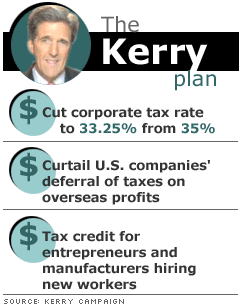NEW YORK (CNN/Money) - Even some economists friendly to Democratic presidential candidate John Kerry say his proposal to end tax breaks on multinational corporations' overseas' profits won't necessarily stop the flow of jobs overseas.

At the same time, a number of more politically conservative economists applauded the proposal to cut corporate income taxes that is part of the plan Kerry unveiled Friday.
Kerry, in a speech being given in Michigan, vowed his corporate tax reform plan would help create 10 million jobs over four years, and would lower the unemployment rate to 4.1 percent from 5.6 percent now.
The plan calls for a cut in the corporate tax rate -- from 35 percent to 33.25 percent -- and would offer a tax credit for many employers, especially small businesses, that create new jobs.
He would cover the cost of those tax cuts by overhauling how overseas operations of U.S. businesses are taxed -- mainly by largely eliminating a tax credit on foreign profits that the Kerry campaign estimates costs $12 billion a year.
The proposal is meant to address the growing anxiety among workers about the threat of their jobs being shifted overseas.
| 
| |

| 
| 
|

|
 CNNfn's Louise Schiavone takes a closer look at Democratic presidential candidate John Kerry's plan to put America back to work. CNNfn's Louise Schiavone takes a closer look at Democratic presidential candidate John Kerry's plan to put America back to work.
|
 Play video
Play video
(Real or Windows Media)
|
| 
|

|
|
"Today, we have a tax code that does more to reward companies for moving overseas than it does to reward them for creating jobs here in America," the text of Kerry's speech said.
"So if I am elected president, I will fight for the most sweeping international tax law reform in forty years -- a plan to replace tax incentives to take jobs offshore with new incentives for job creation on our own shores."
But Christian Weller, senior economist for the liberal think tank the Center for American Progress, said he doesn't know if the Kerry proposal will have much impact on a company's decision about where to hire.
"Tax cuts typically are a very small component in company's hiring decisions," said Weller, whose colleague Gene Sperling is a former economic adviser to President Clinton and now advises the Kerry campaign.
"It won't necessary slow the move of companies and jobs overseas," said Weller, who said he was not involved in drafting the Kerry proposal. "People think the tax policy is a more powerful tool than it really is."
But Weller said the tax credit for domestic job creation could have an impact on spurring hiring. And he said he agrees with the Kerry proposal on overseas taxes as a way to pay for the other corporate tax cuts being proposed.
"There's no good argument for government to be subsidizing moving jobs overseas," he said.
Former Clinton administration economist Leonard Burman, now a senior fellow with the non-partisan Urban Institute, doubts that even the tax credit will do much to spur hiring.
"The experience with past employer (tax) credits is they're not particularly effective," said Burman, who was referred to reporters by the Kerry campaign, but is not advising the Massachusetts Democrat.
But Burman said that the overall cut in the corporate tax rate should help hiring. "It's a better idea from my perspective than a lot of the targeted things," he said.
Cuts supported by conservatives
Kerry's call to lower the overall corporate tax rate also won support from some economists from conservative think tanks, including Eric Engen, of the American Enterprise Institute, and Rea Hederman of the Heritage Foundation.
"That is a step in right direction," said Engen. "Currently U.S. corporate income tax rates are the second highest among major industrialized economies, behind only Japan. That's one of the reasons why companies often times want to keep their profits and invest in other countries with lower tax rates."
But both Engen and Hederman said they doubted Kerry's proposed changes in overseas tax policy or the tax credit for hiring would have much effect on U.S. hiring.
"Given the current political environment of greater protectionist feeling, it (a new international tax policy) might be politically saleable," said Hederman. "Is it a good idea? That's a different question. We'd be hurting competitiveness of American companies overseas."
Greg Valliere, political economist with Schwab Washington Research, said the Kerry proposal is "brilliant" because of offering tax breaks to so many businesses, and playing on the hot-button topic of shifting jobs overseas.
"Politically this is very, very clever," said Valliere. "It puts the White House on the defensive on the whole issue of job outsourcing. There could be some Republicans (in Congress) intrigued by this. But it's way too premature to assume it could be enacted."
But Valliere and Mark Vitner, economist with Wachovia Securities, both say that even if Kerry is elected, his plan wouldn't win congressional approval quickly -- if at all. Thus, it would be a couple of years before it starts to have any measurable impact on hiring and the economy.
"The 10 million jobs may be realistic, but it may not be all that different from what we would see no matter what happens," said Vitner. "We're looking for 3 million jobs to be created in 2004. Even if Kerry is elected, he'll have no bearing on the economy until 2006."

|